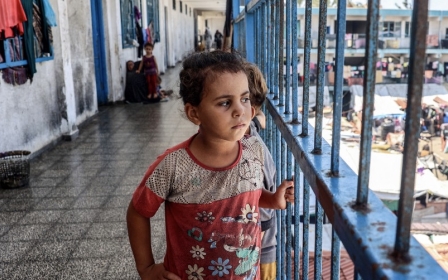Israel's Unrwa ban will be devastating for Palestinians

Those of us who live in the land between the river and the sea go to sleep with one drama reverberating in our minds, only to wake up confronted by another.
Early last week, 92 members of Israel's parliament, the Knesset, passed two laws banning the United Nations agency for Palestinian refugees, Unrwa.
It is an act that seeks to deprive three million people in Gaza, the occupied West Bank and occupied Jerusalem of all their schools, primary healthcare, pharmacies, rubbish collection and many other essential services.
But in a time of war, the ban on Unrwa threatens the whole system of international aid in Gaza as the UN agency provides the infrastructure of drivers, lorries and warehouses on which all else rests.
News also emerged last week that over 1,000 people had been killed in Jabalia in less than a month, with Unicef, the UN child protection agency, reporting just days later that more than 50 children in northern Gaza had been killed in just two days.
New MEE newsletter: Jerusalem Dispatch
Sign up to get the latest insights and analysis on Israel-Palestine, alongside Turkey Unpacked and other MEE newsletters
The massacres were followed by two Israeli attacks on a polio vaccination clinic and a UN aid worker's car that injured at least three children waiting to receive their vaccines during what Israel promised would be a "humanitarian pause".
Clearly, there is no rest from the occupation.
Entire political spectrum
The vote in the Knesset represented the entire spectrum of Jewish Israeli politics.
No one can blame a prime minister or a government cowering behind the extreme right. It represents all shades of Israeli politicians, and therefore, Israel as a whole bears responsibility for a measure of such extreme consequences.
The vote to ban Unrwa represents all shades of Israeli politicians, and therefore, Israel as a whole bears responsibility for a measure of such extreme consequences
I found it fascinating how successfully they made the ban look like a reaction to 7 October, after claims that Unrwa staff took part in the Hamas attacks, claims for which Israel has yet to provide any proof.
One of the proposers of the bill, Canadian-born Sharren Haskel of the National Unity party, and once the youngest member of the Knesset, said: "There is no country in the world where employees of an international organisation would participate in the massacre of its citizens, and the organisation would exist on its soil even one more day."
Haskel is the most active member of the Knesset on this issue.
She founded the Unrwa reform initiative. When former president Donald Trump cut the agency's funding, Haskel campaigned around the world for countries to cut more of it.
Israeli politician Boaz Bismuth, a former journalist and now a Likud member, also weighed in, saying: "Unrwa equals Hamas, period."
Everyone who has followed this issue, however, knows that the bid to ban Unrwa has nothing to do with Hamas.
Follow Middle East Eye's live coverage of the Israel-Palestine war
The first attempts to ban Unrwa began at least two decades ago when Unrwa built a complex in Jerusalem. In 2004, MK Nissan Salominski suggested laying siege to the building: "The UN feels as if they are the leaders of the world."
The so-called centre and left are all part of the same chorus. When he entered politics in 2012, Yair Lapid, who became prime minister in 2022, told Israel's Channel 7: "There is no right of return. At first, they talked about the refugees of '48. Why should the Palestinians be the only nation in the world that has second-generation refugees?"
Of course, Israelis like Lapid dismiss Palestinians' legitimate claims to the land and right of return across generations, even as they simultaneously base their alleged right for Jews of all generations and backgrounds to "return" on events that took place thousands of years ago.
Unrwa's right to exist was questioned again in 2021 when the mayor of Jerusalem, Nir Barkat, proposed a bill to remove the UN agency from the city.
Unrwa is being banned because it is the only agency that recognises Palestinian refugees and the right of return of their descendants.
Erase Unrwa, and you will have no refugee problem. Erase the refugees, and no one has a right of return, except, of course, Jews.
So Aida Touma-Suleiman, a Palestinian Knesset member from Hadash, was more to the point when she addressed the central issue in this move: that Israel wants to banish refugees while doing everything it can to create more of them.
"No Palestinian wants to be a refugee," she said. "The State of Israel is adding hundreds of thousands more to the number of Palestinian refugees - 90 percent of the residents of Gaza have become refugees."
Siege will become airtight
Ahmad Tibi, the leader of the Ta'al party, wrote on X that the laws denying the rights of Palestinian refugees "is part of the broader refusal to recognise the Palestinian people".
As has become common practice, Benny Gantz's National Unity camp had no hesitation in choosing between the Jewish and Palestinian sides in this nakedly sectarian debate.
"In the choice between [Ahmad] Tibi and Bibi [Prime Minister Benjamin Netanyahu], we will put the good of the state before any consideration and continue our efforts to topple the government," it said in a statement.
Moments like these should be recorded by those in the West who pretend that a post-Netanyahu era dominated by Gantz would lead to the creation of a Palestinian state. It would not.
For most MKs who voted for the bills, the fact that the world was telling them not to was reason enough to do it. Meirav Ben-Ari of the Yesh Atid saw the passage of the laws as an important moment of national unity.
But for every Palestinian, these bills spell disaster. "I think the entire aid ecosystem in Gaza will collapse," aid group Action for Humanity's Charles Lawley told MEE. "The quality of life will deteriorate to medieval levels if this goes ahead," he said.
I walked with Suhel Sleman, a Palestinian activist, through Nur Shams refugee camp after a bulldozer had destroyed its only medical clinic. "If Israel doesn't want to collaborate with one of the UN organisations, it should be expelled from the UN," he told me.
Political analyst Ameer Makhoul saw in the ban a fear of being held legally accountable for the fate of the refugees. This could be exploited by Palestinians and Arabs. The fate of the refugees could, he said, become once more an international issue and a point of pressure on Israel.
But for now, the Palestinians have to survive the present. When the ban goes into effect, Israel will stop anyone related to Unrwa or any employee from going through its border crossings and checkpoints.
The siege on all Palestinian villages and towns will have become airtight.
But even if Israel destroys all the symbols of the refugees, it will never succeed in ending the Palestinian liberation struggle or bury its people - whose mosques, churches, and historical sites continue to stand strong.
The views expressed in this article belong to the author and do not necessarily reflect the editorial policy of Middle East Eye.
Middle East Eye delivers independent and unrivalled coverage and analysis of the Middle East, North Africa and beyond. To learn more about republishing this content and the associated fees, please fill out this form. More about MEE can be found here.






